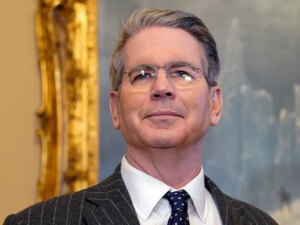The Implications of Moody’s Downgrade: A Wake-Up Call for Investors

In a recent move that rattled the financial community, US Treasury Secretary Scott Bessent responded firmly to Moody’s decision to lower the nation’s credit rating from AAA to AA1. His assertion that Moody’s is a "lagging indicator" reveals a deep-rooted skepticism toward credit rating agencies, a sentiment shared in various forms by former Treasury Secretary Janet Yellen when Fitch made a similar downgrade last year, branding it "arbitrary."
The Current State of Affairs
Political Turmoil and Economic Reality
The backdrop of this downgrade is a landscape fraught with political strife and economic uncertainty. Since the debt ceiling crisis in 2011—when Standard & Poor’s made a similar cut following political gridlock—the market has been on edge. Moody’s warning since May 2023 about potential downgrades due to burgeoning debt and mismanagement has echoed through the financial corridors, yet decisive action remains elusive.
What’s striking this time is the historical context. Moody’s hasn’t changed its rating for the US since 1917, which makes this downgrade not just a statistic, but a signal that merits attention from all corners of the investment world.
What Does This Mean for Investor Confidence?
While Bessent contends that confidence in the US system itself is deteriorating, the ramifications of this downgrade might not force capital to flee the country. The truth is, where would it go? As an investor in today’s economy, understanding this fact is paramount. The US is still the safest haven in a world ripe with instability.
The Critical Role of Confidence
Confidence—in government, financial systems, and economic models—is paramount. Over 70% of US debt is short-term, and with a governmental inability to craft a sustainable budget, the potential for a systemic crisis looms larger than ever. Both parties have their own agendas: Democrats pushing for increased tax revenues and Republicans seeking to slash expenditures. However, both fail to recognize that the real issue extends beyond mere fiscal policy; it is structural reform that is urgently needed.
We at Extreme Investor Network believe that understanding these dynamics is critical for long-term investment strategy. It’s not just about reacting to downgrades; it’s about anticipating wider economic changes.
Looking Ahead: A Shift in the Economic Paradigm
The Economic Confidence Model predicts a turning point around late 2026, suggesting we could be witnessing the decline of government debt as a reliable asset class. For savvy investors, this could be an opportune time to diversify portfolios and reassess the risk associated with holding US debt.
Key Takeaways for Modern Investors
-
Stay Informed: Keep an eye on the evolving economic landscape and the shifting confidence levels in both government and market structures.
-
Diversification is Key: As the market tumult continues, investors should consider exploring non-traditional assets that stand outside the fluctuating capabilities of government debt.
- Engage with the System: Advocating for more transparent and reformed fiscal policies is essential. At Extreme Investor Network, we believe that mindful engagement in financial discourse can lead to better outcomes for all stakeholders involved.
In conclusion, while Moody’s downgrade may seem like a setback, it serves as a critical lens through which we can examine deeper issues within our financial system. Investors must adapt, evolve, and engage with these shifting paradigms to not only survive but thrive in an increasingly complex economic landscape. Your financial future depends on it.
For the latest insights and expertise, stay tuned to Extreme Investor Network, where we empower you to understand and navigate these turbulent waters with confidence.

